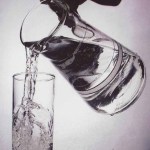I am always telling you to drink plenty of water, and so many of you complain that you don’t like water and that it’s boring!
Well according to Vivien Goldschmidt of ‘Save our Bones’ it is a fascinating substance!
Water is essential to life and here are some interesting facts about it:
- Drinking water can help relieve some types of headaches.
- Newborn babies are about 80% water whereas adults are around 70%
- Most Healthy, average-weight people can drink up to 3 gallons of water without any ill effects.
- There is such a thing as water poisoning but it is extremely rare. If you drink a huge amount of water too quickly, it can result in hyponatremia where your electrolytes become imbalanced and your cells swell with water. When brain cells swell with hyponatremia it can be fatal.
- Your body gets water from many foods such as fresh fruit and vegetables.
- The earth is composed of about 75% water and of that water approx 97% is salt water.
- Only about 1% of the world’s entire water supply is drinkable!
- The earth’s total water mass is 326 million cubic miles.
- In the United States people use about 90 gallons of water a day, and most of it is from flushing the loo!
Water is a giver of life, and sustains life but it also can cause death! Floods, tsunamis and tidal waves can cause death and destruction, drinking dirty water can cause deadly diseases and parasites and even the ‘clean water’ of developed countries can cause disease and ill health.
Inorganic materials are often added to tap water such as fluoride. In this country the authorities want to add it to all water supplies, but the problem is that it has been linked to hip fractures and kidney and liver damage in children. Combined with aluminium, which is also added to our water supplies, it can cause alzheimer-like symptoms, and there are also more than 80 references that link fluoride with cancer.
Another inorganic material that is added to our tap water is chlorine and this reacts with organic elements already present in the water creating a host of new chemicals that may be toxic. These are called disinfection byproducts (DBP) and they make your body very acid. Add these inorganic materials to medication residues and pesticides that are also found in our water and because your body has difficulty processing them all and utilising them they accumulate in the body and cause damage!
Despite all this, the basic truth is that you need to drink water and the purer the water the better.
So much of your body is composed of water, and it is involved in most processes that go on. It is needed for delivering nutrients into cells, and all organs and body systems benefit from drinking water.
Kidneys
Your kidneys regulate your water balance automatically increasing or decreasing the amount of urine you produce depending on your water consumption and other factors. Drinking plenty of water helps the kidneys to do their job, flushing out waste products before they can accumulate and form a stone.
Skin
Dry skin usually means dehydration. Your skin will lose its elasticity and so when you pinch it on the back of your hand it doesn’t bounce back!
Your skin is your largest elimination organ, it helps to remove toxins from your body by sweating. However if there is not enough moisture to produce enough sweat then the toxins accumulate in the liver. Interestingly, in Traditional Chinese Medicine, acne is considered a sign of a toxic liver!
Just remember that moisturisers do not moisturise the skin, they just act as a moisture barrier to provide your skin with what it really needs – water!
Heart
An interesting study published in the American Journal of Epidemiology showed a correlation between water intake and fatal coronary heart disease. Those participants who drank more than 3 glasses of water a day were less likely to suffer a fatal heart attack than those who drank only 2 to 3 glasses of water a day. The researchers also discovered that the risk of cardiovascular disease was increased in those participants who drank fluids other than water. They felt that this may be due to multiple factors, particularly the diuretic effect of caffeinated drinks that could raise the thickness of blood.
There may also be a connection between drinking hard water and heart disease. Hard water is full of inorganic minerals that accumulate in the cardiovascular system and form plaque.
Liver
The liver works closely with the kidneys to keep things balanced, and when you are dehydrated the kidney can no longer function so the liver steps in. To try to help with the lack of water the liver has to decrease some of its other important functions, which means that it won’t metabolise fat properly and will retain water in your tissues for future use. This slows down your whole metabolism for conservation and survival but it is not good for your health or your weight! If you drink plenty of water the kidneys can do their job and leave the liver to do its job! For more information on Kidney Health, visit http://www.thekidneydocs.com/services.html.
Immunity
Water helps to remove toxins from you kidneys, skin and liver which will help the immune system, but the lymphatic system also needs lots of water to produce lymph. Lymph carries white blood cells throughout the body, and water and nutrients to the blood.
Digestive System
I am sure many of you have experienced what happens to your bowel if you have not had water for some time. Your intestine holds on to waste and you become constipated. Water helps to dissolve soluble fibre and increase the volume of waste matter so stimulating the colon to contract. However if you experience diarrhoea you also need to drink water to replace what has been lost.
The Skeletal System – Bones
Water helps in promoting bone health by carrying calcium, magnesium and other bone building nutrients to where it is needed. Toxin build up in the bones can result in inflammatory conditions and bone degeneration, so drinking water, especially alkaline water, flushes the toxins out.
Energy
Dehydration can make you very tired because your body is not functioning properly and your metabolism has slowed right down. If your body has enough water and functions properly you have lots of energy.
Brain
Your brain is about 85% water and so you can see why you develop headaches with dehydration.
Neurotransmitters need water to do their jobs and a lack of water may indirectly decrease your serotonin levels. Depression is often linked to low serotonin levels, and without water the essential amino acid, tryptophan, cannot be properly converted to serotonin, because dehydration prevents it from getting past the blood-brain barrier and into the brain.
The liver, in a state of dehydration, uses tryptophan as an antioxidant to detoxify the body, so then there is less for the brain!
Symptoms of Dehydration
The amount of water you need varies from person to person, and a good recommendation is that you drink half your body weight in ounces! We recommend that you not only drink plenty of water but also make sure that the water you’re drinking is clean. It would be wise to use commercial water purification systems both at home and your workplace.
Here are some of the symptoms of dehydration and you do not have to experience all of them to be dehydrated, you may just have one or two.
- Headaches
- Dry mouth
- Constipation
- Feeling light headed or dizzy
- Thirst
- Fatigue
- Decreased urine output, dark scanty urine
More extreme dehydration may include:
- Extreme thirst
- Lack of sweat
- Crying without tears especially in children
- Loose shrivelled skin
- Very dark urine sunken eyes
- Fever
- Low blood pressure
The purest water is distilled water and next best is water that has gone through reverse osmosis. However a good filtered water is OK but try and make it alkaline with organic bioavailable minerals and a slice of lemon.
Remember to drink regularly, and if you find that difficult make sure you have a litre bottle on your desk or in a place where you see it all the time. Set an alarm every hour to get you into the habit of drinking. Leave notes everywhere and substitute a few coffees or other drinks for water!
Water is one of your paths to wellness, don’t forget, drink regularly, feel better.
At The Wyndham Centre we also have ‘Designer Water’ which is unique to your requirements. Add homeopathic drops to your water to help with stress, inflammation, energy, and rehydration.

